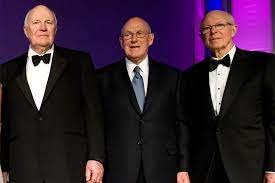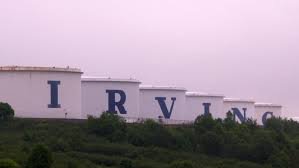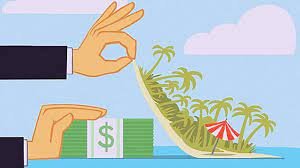The Irvings, tax havens, and the effects of not paying your fair share
It’s no secret that Irving companies have a long history of using off-shore tax havens. No surprise there, but stories put out after a year-long investigation by CBC News and Radio-Canada into Irving’s use of tax havens in Bermuda, are eye-popping in the extent to which the New Brunswick billionaires have gone to avoid paying their fair share of taxes. The review involved combing through numerous files that were leaked in what has been dubbed the Paradise Papers.
JK, Aruthur and Jack Irving. JK and Aruthur’s wealth is estimated at between 6 and 14 billion dollars. Jack passed away in 2005. Photo Credit: Canadiasn Business.
I’m not going to try to detail the legal tax adoidance maneuvers here, but it’s all on the CBC website, and if you are interested, it is indeed interesting reading.
Forbes Magazine estimates that KC Irving’s surviving sons, JK and Arthur, have a combined wealth of between six and nearly 14 billion dollars.
Now let’s just stop there for a minute and consider how much money that really is. Let’s say you make $100 thousand a year. And let’s say you get to keep it all, you don’t have to pay any taxes. In 10 years you’d be a millionaire. Know how many years it would take to become a billionaire? 10,000. That’s how much more a billion dollars is. The Irving brothers are estimated to have up to $14 billion. It is absolutely mind-boggling to think about what they could do with that money.
Photo Credit: CBC
Against that backdrop, and as an interesting aside, CBC has reported that when Irving Oil asked the city of Saint John for a major property tax break for their LNG project, calling it a make-it or beak-it situation, the company was actually sitting on a $250 Million dollar profit. It was estimated that that tax break would cost the city $110 million. The city said yes, and so did the Bernard Lord government of the day in quickly passing legislation to make the huge tax break possible.
That tax break was eventually repealed but not until after Irving Oil benefitted from it for more than a decade.
That tax break was one example of how various Irving companies benefitted from government policy. Others include the sweetheart deals on Crown land that continues to cost New Brunswick taxpayers millions of dollars every year.
Nobody will ever accuse the Irvings of not being astute business people. They ceetainly know how to make a profit. And nobody is suggesting for a minute that they have ever done anything illegal.
In response to the extent of the tax avoidance and government subsidies the family has enjoyed, Premier Higgs is quoted saying "I don't think we can criticize someone for following the rules."
I beg to differ. I would argue that we sure can. While nothing they have done with the tax havens is illegal, is it not fair to criticize the company’s attitude and actions, given that it is the province’s taxpayers who foot the bill for all those subsidies, and it is the New Brunswick workforce that makes much of those profits possible? And it is the New Brunswick economy that suffers from all those avoided taxes. That includes funding for our education, health care, etc.
Their rebuttal has always been that they pay everything they owe. And technically, that is correct, but, as one of the tax experts said in one of those CBC stories, that’s because they owe so little because of their use of tax havens.
In the Daily Gleaner over the weekend, there is a half-page ad taken out by the IWK Children’s Hospital, thanking the Irving Foundation for a $6 million donation. It is true they donate to many good causes, and it buys them a lot of good will. But I can’t help but think that the donations are a small fraction of the money we are out because of the tax havens. If the choice was to have the Irvings pay their fair share of taxes or make donations, that is far from a close call. But it helps them stave off criticism over the taxes. So well worth it from their point of view.
Photo Credit: CBC
Premier Higgs told the CBC his government has no plans to change any policies in light of the new revelations about the Irving’s use of tax havens because there is nothing illegal about them.
No question it is on the federal government to change the rules and here’s to hoping that someday they will. But this isn’t a new issue, and so far, successive Liberal and Conservative governments have shown little appetite to crack down on Canadian companies who use offshore tax havens to avoid taxes. In the case of the Irvings, a lot of those taxes would benefit our provincial coffers. So rather than the “not my problem” position Higgs has taken, perhaps he should consider pushing his federal counterparts to change the tax laws. You know, for the benefit of New Brunswickers.
In the past couple of weeks, New Brunswick economists Richard Saillant and Herb Emery both published columns in the Daily Gleaner and other Postmedia newspapers in the province, on the Higg’s government’s recent tax cuts, which mainly benefit the most well-off New Brunswickers. Both offered different views, one favouring it, the other critical. Both columns were well written and insightful. I wish though, that they or others with their degree of knowledge of economics, would write a column on how better off we would be as a province, if the Irvings, over all these years, hadn’t squirreled away those profits in tax havens but instead had paid taxes on them. Might be tricky getting that column published though. But maybe CBC could commission an economist or two to do it.
It's a thought.
Thanks for reading. As always, shares are appreciated.
Cover photo credit: dreamstime






